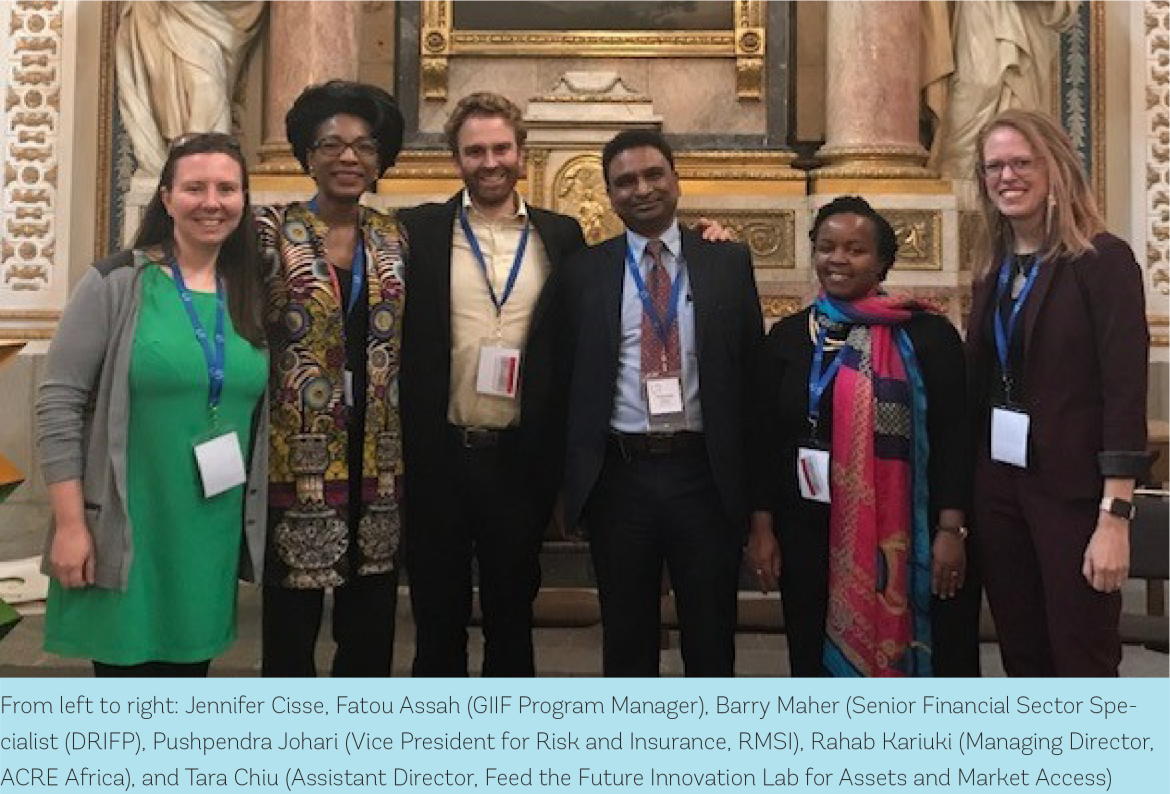Roles of private sector partners in reaching the last mile in delivering agriculture insurance to the vulnerable

International experts and practitioners in climate and disaster assessment, risk management, and risk communication gathered on May 14-18, 2018 in Mexico City at the 2018 Understanding Risk Forum. Organized by the World Bank’s Global Facility for Disaster Reduction and Recovery (GFDRR) every two years, the event provides organizations and individuals with the opportunity to exchange knowledge, highlight new activities and initiatives, establish new partnerships, and foster innovation in the field.
As part of this year’s program, the Disaster Risk Financing and Insurance Program (DRFIP) and the Global Index Insurance Facility (GIIF) had a privilege to organize the session titled “The Last Mile – Private Sector Solutions Delivering Financial Assistance to the Poor” that presented three different real-world case studies from three guest speakers representing the private sector. All of them have years of experience in their respective line of work, developing private sector-led solutions for the poor and the vulnerable to protect them from the impacts of climate and disaster risks.
First, Rahab Kariuki of ACRE Africa shared lessons learned on the distribution of agriculture microinsurance in East Africa. Accumulated years of expertise as a product designer and insurance intermediary that links stakeholders to smallholder-focused agriculture insurance across value chains, and with the financial support of GIIF and the Syngenta Foundation, ACRE Africa has served more than 1.7 million farmers in Kenya, Rwanda, and Tanzania since 2009. The company’s achievement can be attributed to its adoption of mobile technology that allows farmers to self-register for insurance through a mobile application embedded with geolocation. This has resulted in greater distribution efficiency. The farmers find the process effortless, and they can easily learn it from their peers.
Pushpendra Johari of RMSI then revealed the global IT company’s quest to develop innovative products that will build trust between farmers and insurers while also enhancing product quality, pricing, and claim settlement process based on the application of information and data such as GIS (Geographic Information System), remote sensing data, and yield data. Advanced scientific modeling techniques that account for the effects of weather variables and potential risks have led to more accurate forecasting and yield/loss estimation. A key takeaway from the session is that it helps to devise the right datasets for insurers to estimate the risk and price it accurately.
Last, Tara Chio of the Feed the Future Innovation Lab for Assets and Market Access at UC Davis then told a unique story of how involving private actors and an enticing alignment of incentives along the supply chain could contribute to a pathway to higher incomes and resilience for cotton farmers in Burkina Faso. The case offered an insight into how SOFITEX (the biggest cotton company in the country), insurance companies, and farmer cooperatives collaborated to provide more quality insurance products that speak to farmers’ demand. The key outcome of the case: the take up of insurance with the private sector’s involvement was found to be 45% higher than that without an intervention. Also, a critical finding of the research was that insured households increased their subsequent field investments by 170%.
From this session, it is discernable that there are at least three key ingredients to make that high-touch, last mile possible to provide the vulnerable with access to finance: 1) smart application of innovation,2) better usage data, and 3) thoughtful management of relationships. In this period of increasing climate and disaster risks, the global community will go long in our quest to find sustainable solutions as long as we adhere to and realize these notable practices.
About DRFIP and GIIF
Managed by WBG’s Finance, Competitiveness & Innovation Global Practice, both DRIFP and GIIF teams are part of the InsuResilience Global Partnership on climate risk insurance which has a goal to help an additional 400 million people obtain access to direct or indirect insurance coverage by 2020. The GIIF and GIIF teams have been recognized by the World Bank for their achievement in collaborating with partners to generate results, utilize innovation, and share knowledge sharing in the area of Equitable Growth, Finance, and Institutions". Recently this year, the DRFIP was recognized for its unwavering contribution to the development and implementation of Kenya’s Livestock Insurance Program. Last year, GIIF received an award for its global role in helping smallholder farmers build resilience through agricultural insurance.
